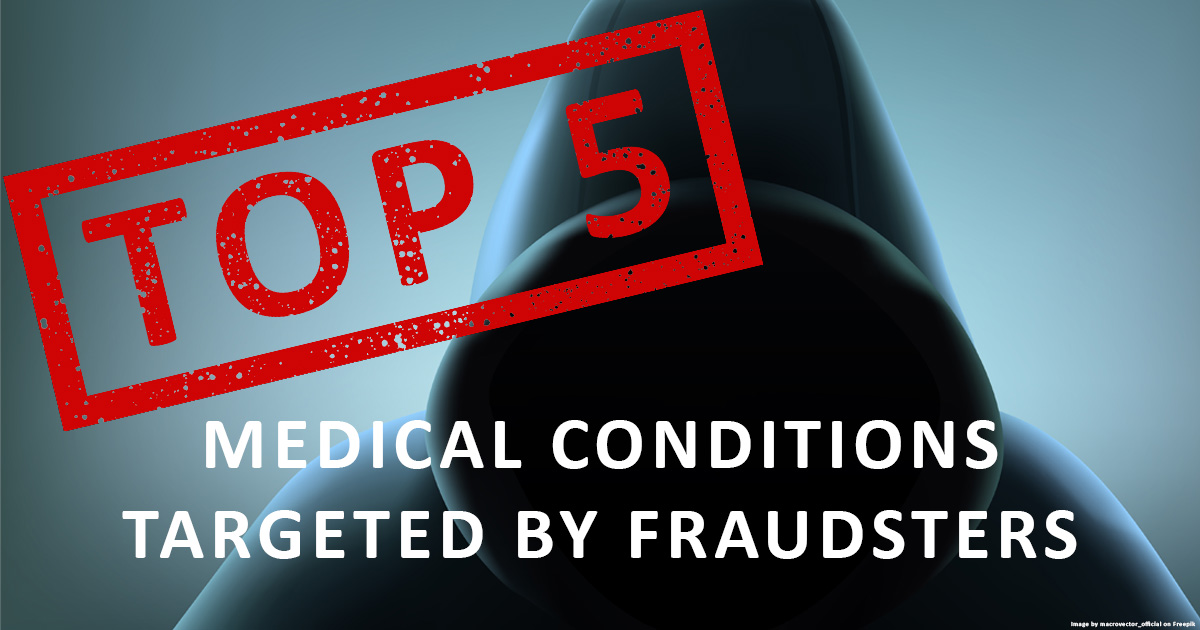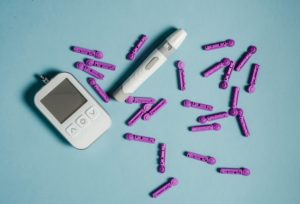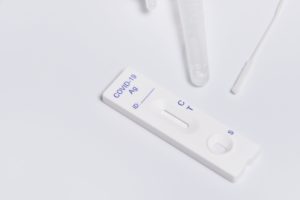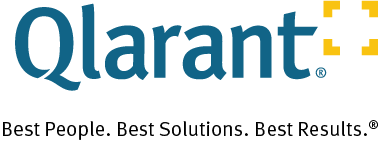Top 5 Medical Conditions Medicare Fraudsters Target

Fraudsters often target common medical conditions and treatments, making many people vulnerable to becoming victims. Here are five common conditions fraudsters target in the Medicare population.
#1 – Diabetes

Diabetes affects over 38 million people in the United States.[1] Treatment for diabetes generally involves oral and injectable medication as well as supplies used to inject insulin and other drugs. Those with diabetes often require care to treat related conditions, such as nerve pain or diabetic foot issues.
People with diabetes are prime targets for recruitment schemes, where fraudsters may promise free or low cost products in exchange for stealing the victims’ insurance information. People who provide their information may end up on telemarketer lists. These lists are then sold to fraudulent pharmacies that bill for unnecessary diabetic drugs and supplies, which may or may not be shipped to the patients. Doctors with ownership interests or receiving kickbacks from pharmacies may prescribe higher-cost medications to increase pharmacy reimbursement.
They may also prescribe duplicative or unnecessary drugs for what’s known as “phantom billing” – billing without dispensing. Because many diabetes drugs, such as Fortamet and Glumetza, are higher in price than cheaper similar versions like metformin, they are useful targets to help fraudsters rake in more cash from inappropriate billing. These pharmacies may also mark up the prices on supplies such as syringes or alcohol swabs, so that a box of alcohol swabs that costs $3 may be billed at over $100 to the insurance.
#2 – Pain
For individuals suffering from chronic pain, the promise of a safe and effective treatment is a strong incentive to try a new product. Fraudulent pharmacies exploit this demand by marketing products, such as compounded prescription pain creams, which are not approved by the Food and Drug Administration (FDA). Pharmacies that sell these products commonly pay kickbacks to doctors for prescribing expensive treatments in lieu of standard, commercially available drugs. These compounded drugs may, at best, not treat the condition, and at worst, cause harm or side effects.
Durable medical equipment (DME) suppliers also exploit patients with pain conditions through unnecessary and possibly non-existent medical supplies. Targeted beneficiaries are often cycled through, supplying items such as braces for multiple body parts over a period of time. These types of schemes are often done with the assistance of willing medical providers who write the prescriptions for these products and receive kickbacks from the DME companies.
#3 – COVID-19

With the advent of COVID-19 and the public health emergency, laboratories were established to solely test for the virus. A common scheme involved the use of drive-through COVID testing sites. A beneficiary would arrive at the testing site for a nasal swab collection, anticipating results to be delivered in 24-48 hours. Fraudulent providers would then bill for extensive lab testing and/or high-level medical visits, which never took place.[2] The individuals affected may only learn of this by reviewing their benefit information.
#4 – Infection
Treatment/prevention of infections is another common area for fraud. Certain pharmacies, colluding with prescribers, may bill for large volumes of high-cost drugs and drug combinations intended for patients to compound and self-administer at home. One popular scheme involves the use of foot baths, a method of soaking the feet with the intent to soothe or disinfect.
Pharmacies advertising these products dispense combinations of high-cost antibiotics and antifungals, with directions to empty the contents of the entire bottle or tube into the footbath. A single prescription may call for 30-60 vials/tubes of a medication that is intended to last an entire course of treatment. This practice has not been proven effective in treating or preventing infections. If used in patients who have active foot infection, this treatment is likely to exacerbate their condition as a result of lack of adequate treatment or side effects to these drugs.
#5 – Genetic Testing
Genetic testing fraud has been rampant in Medicare in recent years. As part of this scheme, recruiters lured patients into signing up for expensive and unnecessary genetic cancer tests. The laboratories profited from billing for these tests and paid kickbacks and bribes to medical professionals for approving them as medically needed without any patient interaction or with only a brief telephone conversation. Despite significant cost to Medicare, the test results were often not provided to the beneficiaries or were worthless to their actual doctors.[3]
Certainly, these 5 schemes are not all-encompassing. Fraud continually evolves with the development of new drugs and fraud detection methods. It is also important to note that while this list is centered on Medicare Parts C and D fraud, Medicaid and private insurance recipients can fall prey to similar schemes.
Through data analysis and investigative capabilities, Qlarant continues to identify emerging fraud schemes and billing targets in Medicare Parts C and D. Continued partnerships with CMS, health plans, and law enforcement, allow Qlarant to continue the important work of safeguarding the Medicare program and protecting taxpayer dollars.
If you become aware of or think you may be a victim of one of these fraud schemes, you may report the issue to:
- The health insurance company
- The State Insurance Fraud Bureau
- The Office of Inspector General (OIG), particularly for Medicare and Medicaid fraud, at 1-800-HHS-TIPS or https://tips.oig.hhs.gov.
- Medicare at 1-800-MEDICARE (1-800-633-4227) for Original Medicare fraud or the Investigations Medicare Drug Integrity Contractor (I-MEDIC) at 1-877-7SAFERX (1-877-772-3379) for fraud in a Medicare Advantage Plan or a Medicare drug plan.
Authors:
Anna Godik, PharmD
Laura Moneymaker, BSN, RN
[1] Centers for Disease Control and Prevention (CDC) National Diabetes Statistics Report. https://www.cdc.gov/diabetes/data/statistics-report/. Reviewed November 29, 2023. Accessed January 2, 2024.
[2] Justice department announces nationwide coordinated law enforcement action to combat health care-related COVID-19 fraud. Justice.gov. Published April 20, 2022. https://www.justice.gov/opa/pr/justice-department-announces-nationwide-coordinated-law-enforcement-action-combat-health-care. Accessed January 2, 2024.
[3] Press Release. Federal Law Enforcement Action Involving Fraudulent Genetic Testing Results in Charges Against 35 Individuals Responsible for Over $2.1 Billion in Losses in One of the Largest Health Care Fraud Schemes Ever Charged. Justice.gov. Published September 27, 2019. https://www.justice.gov/opa/pr/federal-law-enforcement-action-involving-fraudulent-genetic-testing-results-charges-against. Accessed January 2, 2024.







